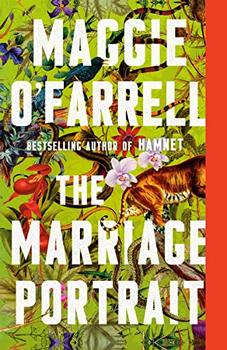Summary | Excerpt | Reading Guide | Reviews | Beyond the Book | Readalikes | Genres & Themes | Author Bio

Critics' Opinion:
Readers' Opinion:
First Published:
Sep 2022, 352 pages
Paperback:
Jul 2023, 352 pages
 Book Reviewed by:
Book Reviewed by:
Rose Rankin
Buy This Book
A Wild and Lonely Place
Fortezza, near Bondeno, 1561
Lucrezia is taking her seat at the long dining table, which is polished to a watery gleam and spread with dishes, inverted cups, a woven circlet of fir. Her husband is sitting down, not in his customary place at the opposite end but next to her, close enough that she could rest her head on his shoulder, should she wish; he is unfolding his napkin and straightening a knife and moving the candle towards them both when it comes to her with a peculiar clarity, as if some coloured glass has been put in front of her eyes, or perhaps removed from them, that he intends to kill her.
She is sixteen years old, not quite a year into her marriage. They have travelled for most of the day, using what little daylight the season offers, leaving Ferrara at dawn and riding out to what he had told her was a hunting lodge, far in the north-west of the province.
But this is no hunting lodge, is what Lucrezia had wanted to say when they reached their destination: a high-walled edifice of dark stone, flanked on one side by dense forest and on the other by a twisting meander of the Po river. She would have liked to turn in her saddle and ask, why have you brought me here?
She said nothing, however, allowing her mare to follow him along the path, through dripping trees, over the arch-backed bridge and into the courtyard of the strange, fortified, star-shaped building, which seemed, even then, to strike her as peculiarly empty of people.
The horses have been led away, she has removed her sodden cloak and hat, and he has watched her do this, standing with his back to the blaze in the grate, and now he is gesturing to the country servants in the hall's outer shadows to step forward and place food on their plates, to slice the bread, to pour wine into their cups, and she is suddenly recalling the words of her sister-in-law, delivered in a hoarse whisper: You will be blamed.
Lucrezia's fingers grip the rim of her plate. The certainty that he means her to die is like a presence beside her, as if a dark-feathered bird of prey has alighted on the arm of her chair.
This is the reason for their sudden journey to such a wild and lonely place. He has brought her here, to this stone fortress, to murder her.
Astonishment yanks her up out of her body and she almost laughs; she is hovering by the vaulted ceiling, looking down at herself and him, sitting at the table, putting broth and salted bread into their mouths. She sees the way he leans towards her, resting his fingers on the bare skin of her wrist as he says something; she watches herself nodding at him, swallowing the food, speaking some words about their journey here and the interesting scenery through which they passed, as if nothing at all is amiss between them, as if this is a normal dinner, after which they will retire to bed.
In truth, she thinks, still up by the cold, sweating stone of the hall's ceiling, the ride here from court was dull, through fields stark and frozen, the sky so heavy it seemed to droop, exhausted, on the tops of bare trees. Her husband had set the pace at a trot, mile after mile of jolting up and down in the saddle, her back aching, her legs rubbed raw by wet stockings. Even inside squirrel-lined gloves, her fingers, clutching the reins, had been rigid with cold, and the horse's mane was soon cast in ice. Her husband had ridden ahead, with two guards behind. As the city had given way to countryside, Lucrezia had wanted to spur her horse, to press her heels into its flank and feel its hoofs fly over the stones and soil, to move through the flat landscape of the valley at speed, but she knew she must not, that her place was behind or next to him, if invited, never in front, so on and on they trotted.
At the table, facing the man she now suspects will kill her, she wishes she had done it, that she had urged her mare into a gallop. She wishes she had streaked by him, cackling with transgressive glee, her hair and cloak lashing out behind her, hoofs flinging mud. She wishes she had turned the reins towards the distant hills, where she could have lost herself among the rocky folds and peaks, so that he could never find her.
Excerpted from The Marriage Portrait by Maggie O'Farrell. Copyright © 2022 by Maggie O'Farrell. All rights reserved. No part of this excerpt may be reproduced or reprinted without permission in writing from the publisher.





The Flower Sisters
by Michelle Collins Anderson
From the new Fannie Flagg of the Ozarks, a richly-woven story of family, forgiveness, and reinvention.

The House on Biscayne Bay
by Chanel Cleeton
As death stalks a gothic mansion in Miami, the lives of two women intertwine as the past and present collide.

The Funeral Cryer by Wenyan Lu
Debut novelist Wenyan Lu brings us this witty yet profound story about one woman's midlife reawakening in contemporary rural China.
Your guide toexceptional books
BookBrowse seeks out and recommends the best in contemporary fiction and nonfiction—books that not only engage and entertain but also deepen our understanding of ourselves and the world around us.